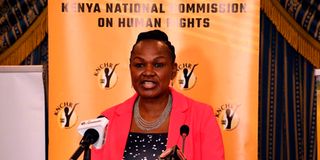Campaign violence, child abuse threat to elections, says rights group

KNCHR Chairperson Roseline Odede makes her remarks during a media briefing on August 3, 2022 at the Stanley Hotel, Nairobi on the level of election preparedness.
Election-related deaths, insecurity, violence, assault, threats, misuse of public resources and social media and biased access to campaign venues for political outfits, still stand in the way of peaceful and credible elections next week, the Kenya National Commission on Human Rights (KNCHR) has said.
Also, the abuse of children’s rights is rife, with children being used in political rallies, an act that the commission warns exposes the young ones to dangers, including political violence, foul language and uncouth practices.
At least 146 incidences of child misuse have been recorded so far.
The commission also announced plans to release more than 100 staff members next week to join its 150 field monitors already deployed across the country to monitor, document and report incidents that may undermine the integrity of the elections next Tuesday.
While hailing the key election management agencies, including the Independent Electoral and Boundaries Commission (IEBC), the Judiciary and the National Police Service for acting proactively to properly manage the elections, KNCHR cautions that failure to deal with aforementioned vices could result in dire consequences in the elections.
Through the election monitors, the commission has monitored and documented at least five election-related deaths since February.
Two of these were as a result of road accidents involving vehicles associated with aspirants while the other three died from injuries allegedly inflicted by rival political factions.
Insecurity in the warring counties of Elgeyo Marakwet, West Pokot, Baringo and Marsabit also pose a threat on the residents’ participation in the elections, a situation made worse by the closure of schools mapped as polling stations in those areas.
Families have also been displaced owing to insecurity, and might be denied the right to vote.
At least 50 cases of pre-electoral violence and 28 cases of assault have been recorded, with most occurring during public rallies.
Meting out violence
The public has also been condemned for meting out violence against police officers in two separate incidents, one being in Nairobi during the chaotic political rally at Jacaranda Grounds, and another one in Kisii during an IEBC briefing that left a police officer injured.
These cases of assault were recorded in Nairobi, West Pokot, Kisumu, Kakamega, Isiolo, Mombasa, Bungoma and Kisii.
Police conduct has also been praised over the past few months, with the commission noting that officers are adhering to the legal framework on the use of force and firearms and force in containing violent situations avoiding fatalities while also making an effort to arrest the perpetrators.
“The commission commends the restraint and professionalism that has been demonstrated by the law enforcement agencies and their officers thus far … However, this role by the security officers cannot be delivered without the cooperation from Kenyans in taking personal responsibility and accountability,” Ms Roseline Odede, the KNCHR chairperson, said.
Threats, harassments and intimidation through inflammatory speeches on political platforms and the media have also been flagged.
So far, 44 such cases have been flagged by the commission. The misuse of social media to advance hate messages targeted on political players and online violence against special interest groups such as women, which has an adverse effect on the right to vote and to be voted for, is “worrying”, the commission noted.
Also read: Let’s just vote, accept results and move on
During the official campaign period, 73 cases of inducement and undue influence have been observed in Nairobi, Bungoma, Isiolo, Kiambu, Kakamega, Kilifi, Kirinyaga, Kisumu, Kwale, Meru, Migori, Mombasa, Nakuru, Nandi, Nyamira, Nyeri, Samburu, Siaya, Uasin Gishu, Wajir and West Pokot counties.
Misuse of public resources and personnel during the campaigns also continues unabated, with 44 cases being documented, with the commission noting that this gives incumbents an unfair advantage over the other candidates.
The IEBC has been commended for efforts it has put into promoting civic education and awareness through voter information for the 2022 General Election.
The commission, however had a bone to pick with political leaders who do not use the right channels to air their concerns over the management of the election.
Dissenting voices
“The KNCHR urges that dissenting voices to embrace closed-door dialogue before using the court of public opinion where misconstrued information can lead to public discord and further curtail the enjoyment of human rights,” Ms Odede said.
Though optimistic of a smooth transfer of power after the election, the KNCHR called on the Inspector General of Police to deploy additional security to areas where civil unrest may arise owing to disgruntlement in the event their favourite leaders do not win.
Surprisingly, only one presidential candidate, Agano Party’s David Mwaure, signed the Human Rights and Accountability Charter, spelling out roles and responsibilities of the political parties’ presidential flagbearers approved by the IEBC, prepared by the KNCHR.
This, Ms Odede said, poked holes in the commitment to respect, protect and promote human rights of the soon-to-be elected leaders.
The public has also been urged to reach out to the Commission through its toll free number 000 720627 and SMS number 22539 in case of any unsettling electoral situations.





